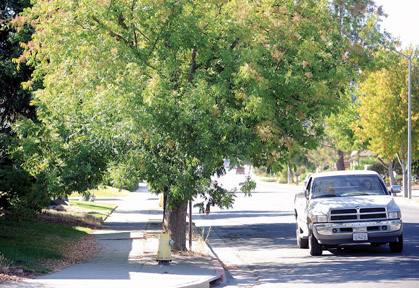
Move may encourage more public participation
Recognizing that removing economic barriers to sidewalk
improvements or street tree maintenance may encourage property
owners to make upgrades that the city doesn’t have the staff or
budget to take on, Hollister recently waived the fees it used to
charge for sidewalk and street tree maintenance.
Move may encourage more public participation
Recognizing that removing economic barriers to sidewalk improvements or street tree maintenance may encourage property owners to make upgrades that the city doesn’t have the staff or budget to take on, Hollister recently waived the fees it used to charge for sidewalk and street tree maintenance.
Acting on a recommendation from Engineering Manager Rudi Golnik, the city council adopted a resolution that eliminates the minimum $163 fee and $500 deposit that property owners were required to pay to work within the public right-of-way – typically the sidewalk in front of homes.
“These property owners do the city a tremendous service by taking on repairs and plant maintenance,” Golnik said. “It seemed a bit absurd that we would hit them with a bill for reconstruction of a sidewalk or driveway or removal of a tree due to the root system lifting the sidewalk.”
Residents looking to work in the public space in front of their homes must still fill out an encroachment application with the city, receive an inspection from a staff member and receive guidance on review of their plans. But they will no longer have to pay a fee in addition to doing the work themselves.
“We still review that things are constructed to city standards and that people have insurance indemnifications,” Golnik said. “The fee is waived, but they will still go through the process.”
The city for years was responsible for all sidewalk repairs, he noted. It now conducts repairs “based primarily upon healthy and safety and risk management,” according to a report presented to the council.
“Nowadays, the city doesn’t have the resources to go make the sidewalk repairs as per past practice,” Golnik said. “Some property owners are now taking that on themselves. It’s a partnership, and we’re hoping it’s a win-win, as it enhances the frontage and property owners reduce their liability for a trip-fall hazard.”








